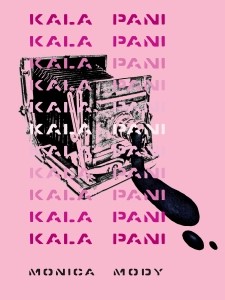
1913 Press
92 pp, $16.00
Review by Kate Schapira
In the Canterbury Tales, some travelers meet by chance at an inn. They tell each other stories to pass the time, and the stories reveal their world—its hypocrisies, its ideals and bad deals, its deflations and delectations. The people in them undergo suffering, humiliation, glory and pleasure, but the major relish is in the recounting itself. In Kala Pani, Monica Mody’s strange new text, six world travelers—travelers from the First through Sixth Worlds—are becalmed in their travels by the new government, who’s withholding their visas and planning to chop down the tree they lean against. They, too, tell stories that reveal their feverish, gaudy and hamstrung worlds, painting the insides of their cages with every available secretion.
Kala Pani draws some of its black water from the same mutated gene pool as the work of Joyelle McSweeney, Lara Glenum and Feng Sun Chen: monstrous porous bodies, profit and lust, e-surveillance, and the sores kept open by attempts at control. It draws on the recent past’s most marketable stories and categories, and shares with McSweeney in particular its filmic stutter; the audience is also a character, and not a harmless one, within the queasy frame. “Contradictory structures had left the audience breathing hard. Were they expected to play? If so, what was their role, and how much sugar?”
Later, as “CERTAIN CORPSES FLOAT ASHORE”, the Fifth World Traveler intones, “You, too, are guilty. What can you remember? What do you miss the most? Here are the rules of the game,” and adds in a footnote, “Go on, play it. In fact, I insist you must.” There is no escape. Like the lentil bean character, who starts its story in a literal cage, we may dress in “increasingly sexless t-shirts and pajamas” or “plus-sized earrings, hooped neckties, rogue haircuts, flannel gadgets, caramelized chains …” and a page more’s worth of costume, but we will end up in the soup.
Kala Pani fits the loose editorial definition of a hybrid text: it combines the intense play of poetry, language as live field (“Baby raked the smell of mothermilk into a cracked balloon bag and wiped her feet on it”) with structures of screenplay, newsfeed and public relations statement (“They looked for clients who offered super graphics and stunning sound”) as well as narrative threads and characters who keep the same names throughout the book. Hybrid also refers to mingling and impurity, the creation of “new” and “mixed” organisms, a hint of praise mixed in with a hint of condescension, as if from the assumption that the speaker, of course, is not a hybrid. Is pure. Kala Pani is a degustatory, disgusticulously impure text; it makes use of forms, like stories, that it also mistrusts:
Spending the days delirious, so happy to be loved, so happy to be in this blank
bliss, so happy in this story this truth never before, biting from the inside out …A story’s hand curled around their neck, rubbed their earlobe of silk and they
moaned and their vagina soaked and they shut the door on questions. The story
ordered a huge feast that night, all its friends came over, and the world travelers
danced and danced and felt quite stormy.As they finished their training, a small part of them realized that the story stirred
into them was darkended, but they were too afraid to dwell on it further.
Lovers kiss in the moonlight, but lovers and moonlight are both in a junkyard of capitalism, and their raconteur claims not to have the language to reveal herself or them—“these immortal lovers,” “these important lovers,” whose importance and immortality are adulterated, mined, commodified by the other elements of their story. “I turned them into media sensations,” recounts that chronicler, who with the other World Travelers is stalled, surveilled and eventually burned on a pyre at the greedy behest of the new government, into which everything in the world of this text seems to play—including us, whoever we are, as we read, by reading, not only by reading.
In a 1986 interview, playwright Maria Irene Fornes said, “[In Waiting for Godot] Pozzo beats on Lucky and at the end Lucky doesn’t get free, but it doesn’t matter because I do!” Reading, I felt played by Kala Pani; I wanted the way out of the cage to be in the book. I wanted to see someone get free, or go home. But if there’s pleasure here it’s in the telling—the flock of ducks in seven pages of gleeful linguistic permutations is just one example—and if there’s freedom to be made here it’s in what a reader, a listener, does when the stories are over and the audience pours out blinking into the street.
***
Kate Schapira lives in Providence, RI, where she writes, teaches, and co-runs the Publicly Complex Reading Series. She’s the author of four books of poetry, most recently The Soft Place (Horse Less Press); her ninth chapbook, Overheard While Hiding From the Sun, is coming out this year with Above/Ground Press.
![[PANK]](https://pankmagazine.com/wp-content/themes/pank/assets/images/pank-logo-large.png)
